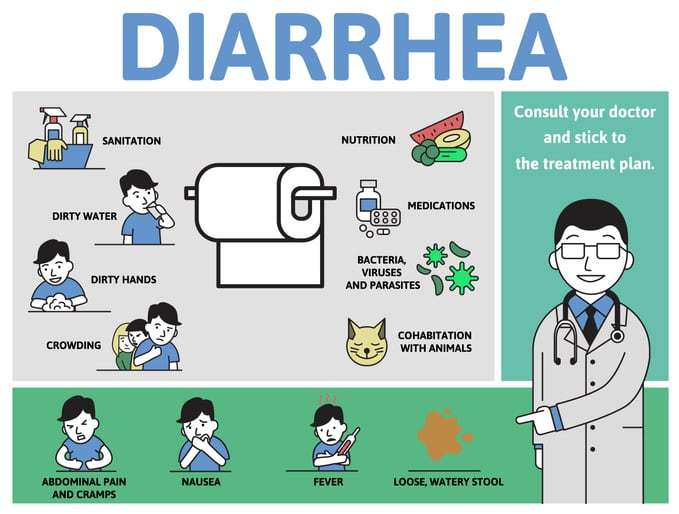Everyone at some point will struggle with stomach cramps and diarrhea, which are often accompanied by abdominal pain and cramping. There are myriad reasons why you may be experiencing abdominal pain, cramps, or diarrhea. Most aren’t too serious, and many don’t even require a trip to the doctor. However, even if you have a mild case of gastrointestinal upset, it’s wise to deduce what’s causing it, so you can feel better faster and ultimately receive treatment if you need it.
Read on to learn about the most common causes of stomach pain and diarrhea, and if you should see a doctor.
What Causes Stomach Cramps and Diarrhea
In many cases, the underlying causes of diarrhea and abdominal pain are caused by a bacterial or viral infection, or from a reaction to food. In the majority of these cases, the stomach cramps will simply go away on their own. Even the stomach flu, in most cases, doesn’t require any treatment other than the “wait it out” method.
It’s estimated that roughly 20 percent of Americans have food sensitivity issues, which can have a sudden onset at any time. Rich and fat-laden foods can cause stomach upset, as well as indigestion from overeating. In the case of food sensitivities, many physicians recommend elimination diets to help isolate the food(s) that are causing the gastrointestinal disturbance. In an elimination diet, you remove many different foods and food groups from your diet, reintroducing them one by one until the culprit is found. For example, for those with celiac disease, foods with gluten cause the stomach upset. When it comes to overeating, portion control is advised. Eating smaller portions, chewing food thoroughly, and opting for high-fiber foods can help stamp out any upset, stomach cramps, and diarrhea.

If Stomach Pain And Diarrhea Are Ongoing
When you have stomach upset related to infection, food intake, or overeating, it will likely pass in a matter of days or a week. If you experience ongoing diarrhea and stomach upset, however, it may be indicative of a medical problem such as irritable bowel syndrome (IBS) or inflammatory bowel disease (IBD). IBS is a non-serious condition, as it does not damage the digestive tract, but still can cause uncomfortable symptoms such as diarrhea, stomach cramps, and bloating. To improve quality of life, patients should reduce their stress levels, make some dietary changes as advised by their physician, get plenty of sleep, and exercise regularly. However, a doctor should evaluate you for persistent diarrhea to confirm it is IBS and not a more serious issue.
IBD, on the other hand, can cause damage to the digestive tract and requires more treatment than IBS. Inflammatory bowel disease is a collective name for several GI conditions, including ulcerative colitis and Crohn’s disease. Beyond cramps and diarrhea, you may also experience fatigue, weight loss, and blood in the stool. There is no cure for IBD, but doctors can help manage symptoms and inflammation with lifestyle changes and pharmacotherapy to help keep the disease under control.
There are also other reasons for ongoing and persistent diarrhea and stomach pain, including stress, alcohol intake, and certain medications. In modern times, it is certainly hard to manage stress, but mental health and physical health are so profoundly interconnected. If you find you are under a high level of stress, physicians and therapists suggest mindfulness practices, deep breathing exercises, regular physical exercise, and therapy as needed. Those who have clinical levels of anxiety and/or depression should seek a mental health professional for potential medications that may help with stress.
Over-drinking can also cause GI upset. According to the U.S. Dietary Guidelines for Americans, women should not consume more than one drink daily, and men no more than two. Medications can also cause GI upset, such as antacids, metformin, antibiotics, chemotherapy medication, and nonsteroidal anti-inflammatory drugs (NSAIDs).
When to See a Doctor
There can be other, more serious reasons for abdominal pain and diarrhea, although these are far less likely: cancer, intestinal problems, severe gastric problems, and appendicitis. The two attributes you should consider as you prepare to see a doctor are the duration of the symptoms, and their severity. If your diarrhea and abdominal symptoms last for more than a few days, are severe in nature, or are both acute and prolonged, it’s time to make an appointment. You should also be aware of blood in the stool, confusion or extreme fatigue, irritability, rapid heart rate, and vision problems. Infants and those who are immunocompromised or elderly should seek treatment immediately.
If you need to see a physician for management of your gastrointestinal upset, diarrhea, or abdominal pain, book an appointment at GI Associates today.
